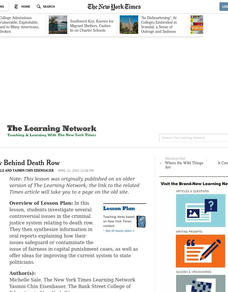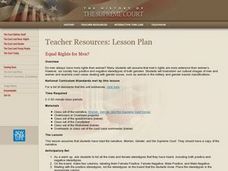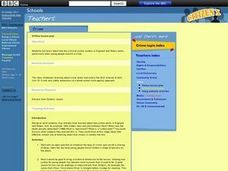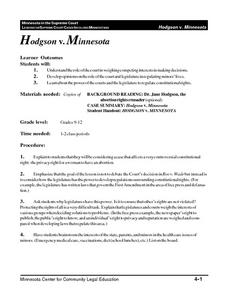Curated OER
Voters and Judges
Learners analyze the work on independent judiciaries. In this federal courts lesson, students listen to their instructor lecture on details of federal cases. Learners respond to discussion questions and participate in an activity...
Curated OER
Lesson: The U.S. Westward Movement
Learners research the U.S. Westward movement. In this U.S. history lesson, students research the topic, complete a creative writing activity for the lesson, and a design activity for the lesson.
Curated OER
The Row Behind Death Row
Students investigate several controversial issues in the criminal justice system relating to death row and give oral reports explaining how their issues safeguard or contaminate the issue of fairness in capital punishment. They offer...
Curated OER
Indiana Courts: How Do They Work?
Students identify the branches of Indiana's judicial system and determine the differences between the different courts and different types of cases. Students create a flow chart showing how a court case works its way through the legal...
Curated OER
For The Sake Of Security: U.S.A. Patriot Act & Bill of Rights
A substantive New York Times article about the U.S.A. Patriot Act, military tribunals, racial profiling, and the Bill of Rights forms the basis for a discussion of the complex interplay of fundamental American rights and the aftermath of...
Deliberating in a Democracy
Domestic Violence
Students examine domestic violence issues. In this global studies lesson, students read a case study on domestic violence. Students take notes on the case and respond to discussion questions.
Curated OER
Synonyms and Antonyms
Mix up your writing lessons by having kids look at recent newspaper articles instead of their own work. They work in pairs and rewrite sports news articles using synonyms and antonyms for a set number of words. Then they share their work...
Curated OER
Supreme Court Confirmation Process
Students examine the Supreme Court and the confirmation process. They simulate a confirmation hearing with students role-playing as nominees and others as members of the Judiciary Committee. Students compose short essays outlining the...
Curated OER
Words Can Hurt: King Day
Students explore stereotyping. In this moral and character development lesson, students share reactions to a T-chart displaying what boys can do and girls can not do. Martin Luther King's accomplishments are discussed, and students...
Curated OER
Badminton
Students evaluate their partner in playing a game of badminton. In this badminton lesson, 8th graders explain the rules of the game and participate in a warm up. Additionally, students observe their partners by completing a...
Curated OER
Equal Rights for Men?
Study the issue of gender bias in court cases with a resource that ponders the extent of gender equality. Learners examine cultural images of men and women and examine court cases dealing issues such as women in the military.
Curated OER
Apple Estimation: Percentages & Subjective Reasoning
Students practice using their estimation skills by utilizing apples. In this percentage lesson, students utilize a scale and an apple to discover the percentage of each bite they take. Students share their data with the rest...
American Documentary
The Benefits and Drawbacks of Plea Bargains
The outcome of 90 percent of criminal cases in the US is determined by plea bargains. Clips from the documentary Better This World create the backdrop for an investigation of the benefits and drawbacks of the plea bargaining process....
BBC
Crime: Justice
Are the juvenile courts fair? Learners read a bit from the classic Oliver Twist to consider how young people are treated and represented when they've been accused of a crime. They read a case study from their books, discuss children's...
Curated OER
Hodgson v. Minnesota
Students investigate the role of and develop opinions of the court in weighing competing interests in making decisions. They examine the power of the courts and legislature to regulate constitutional rights.
Curated OER
Moot Court Preparation
Twelfth graders prepare themselves for a mock moot court. In groups, they are presented with an overview of each activity and research appellate cases related to the topic given to them. They identify regions of the country that have...
Curated OER
Civil Rights and the Michigan Supreme Court II
High schoolers view a PowerPoint presentation on the Michigan Supreme Court Historical Society's Civil Rights and/or the Native American Rights. They write a reaction paper and prepare for a class discussion. They work in groups and...
Curated OER
the International Criminal Court's History And Uses
Students analyze and come to explain the history behind the formation of the International Criminal Court, along with the recent controversy facing the Court; and current crises that warrant the Court's attention.
Curated OER
Criminal Law -- Miranda
Students examine the law and the Miranda rights. They role play members of law enforcement and ones being arrested.
Curated OER
Ghosts of Rwanda: Reconciliation and Reparations
Students examine a specific case of genocide participation in Rwanda. Working in groups, they simulate the courtroom drama, from the positions of victim, perpetrator, and court monitor. They conclude by writing essays on the...
Curated OER
Still Burning
Students study about an infamous 1964 crime and discuss opinions on a recent verdict in the case from different perspectives.
Curated OER
Children's Accountability for Their Crimes
Students participate in a round-table discussion about the juvenile justice system and investigate the 'age of accountability' debate. They write a persuasive essay supporting or refuting the punishment received by the children discussed...
Curated OER
Symbolic Speech
Ninth graders consider the right of freedom of speech as it is outlined in the U.S. Constitution. They receive background information for the US Supreme Court, the Bill of Rights, and free speech. They discuss a series of actual cases...
Curated OER
What Makes a Good Law?
Why were laws created? Spark a group discussion on why we need laws to co-exist. Should the sale of some things be outlawed on Sundays? Read a case summary between Target and the state of Minnesota that debated this issue. Ask your...

























